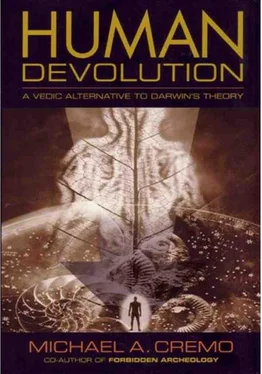Michael Cremo - Human Devolution - A Vedic Alternative To Darwin's Theory
Здесь есть возможность читать онлайн «Michael Cremo - Human Devolution - A Vedic Alternative To Darwin's Theory» весь текст электронной книги совершенно бесплатно (целиком полную версию без сокращений). В некоторых случаях можно слушать аудио, скачать через торрент в формате fb2 и присутствует краткое содержание. Год выпуска: 2003, ISBN: 2003, Издательство: Torchlight Publishing, Жанр: Старинная литература, на английском языке. Описание произведения, (предисловие) а так же отзывы посетителей доступны на портале библиотеки ЛибКат.
- Название:Human Devolution: A Vedic Alternative To Darwin's Theory
- Автор:
- Издательство:Torchlight Publishing
- Жанр:
- Год:2003
- ISBN:9780892133345
- Рейтинг книги:4 / 5. Голосов: 1
-
Избранное:Добавить в избранное
- Отзывы:
-
Ваша оценка:
- 80
- 1
- 2
- 3
- 4
- 5
Human Devolution: A Vedic Alternative To Darwin's Theory: краткое содержание, описание и аннотация
Предлагаем к чтению аннотацию, описание, краткое содержание или предисловие (зависит от того, что написал сам автор книги «Human Devolution: A Vedic Alternative To Darwin's Theory»). Если вы не нашли необходимую информацию о книге — напишите в комментариях, мы постараемся отыскать её.
Human Devolution: A Vedic Alternative To Darwin's Theory — читать онлайн бесплатно полную книгу (весь текст) целиком
Ниже представлен текст книги, разбитый по страницам. Система сохранения места последней прочитанной страницы, позволяет с удобством читать онлайн бесплатно книгу «Human Devolution: A Vedic Alternative To Darwin's Theory», без необходимости каждый раз заново искать на чём Вы остановились. Поставьте закладку, и сможете в любой момент перейти на страницу, на которой закончили чтение.
Интервал:
Закладка:
So both the Shrimad Bhagavatam and widely held versions of the Big Bang cosmology of modern science posit an eternal transcendental existence from which our universe of matter, with its features of time and space, arises. Once this is admitted, we can then decide which version of ultimate reality has the most explanatory power, when applied to the variegated reality of our experience. Modern cosmologists and other theorists have a great deal of difficulty in coaxing a sufficient amount of variety from the rather smooth and featureless universe that, according to theory, expands from the quantum mechanical vacuum. The origin of consciousness also poses a difficult problem. In light of this, an ultimate reality that is itself variegated and conscious might offer a solution.
In the spiritual world, King Puranjana originally existed in relationship with the Personality of Godhead, Krishna. Having departed from the spiritual world by misuse of independence, King Puranjana journeys through the material world. According to the Vedic cosmology, the material world is manifested by a special expansion of the Personality of Godhead. This expansion is called Maha Vishnu, who rests as if sleeping on the Causal Ocean. From the pores of the Maha Vishnu come millions of material universes. They emerge from the body of the Maha Vishnu in seedlike form, and then, energized by the glance of Maha Vishnu, expand in size. This provides an interesting parallel to some versions of the modern Big Bang cosmology, which also posit many expanding universes. Maha Vishnu then expands into each universe, and there emerges from Him in each universe a subordinate creator god called Brahma. Brahma is a soul who is given a very powerful material body with which to perform his creative functions. From Brahma come many other subordinate gods who control various aspects of the material universe. Surya is in charge of the sun, Chandra is in charge of the moon, Varuna is in charge of the waters, and so on. Brahma also creates the various material bodies that souls like Puranjana will enter. All together, there are 8.4 million kinds of bodies, ranging from microbes to demigods.
In his journey through the material world, Puranjana is accompanied by Avijnata Sakha (“the Unknown Friend”). The Unknown Friend corresponds to the Supersoul expansion of God into the hearts of all living beings. When Puranjana leaves God and the spiritual world, his memory of them becomes covered. But unknown to Puranjana, God accompanies him on his journey through the material world. According to the Shrimad Bhagavatam , God accompanies all spirit souls in the material world as their Unknown Friend, who observes and sanctions their activities.
In the West, mind/brain dualism is identified with the French philosopher René Descartes, who posited the existence of (1) matter extended in space and (2) mind existing outside space. Cartesian dualism is characterized by an interaction between mind and matter, but explaining how this interaction takes place proved problematic for advocates of the Cartesian model. How, for example, are impressions transmitted from the realm of matter to the completely different realm of mind?
According to the Shrimad Bhagavatam , both matter and the souls in the material world are energies of God, and as such both have a single spiritual source. The Shrimad Bhagavatam philosophy is thus both dualist and monist, simultaneously. The interactions of matter and the soul in the material world are mediated by Supersoul, who exists inside each material atom and also accompanies each spirit soul. By the arrangement of Supersoul, impressions of material experience can be channeled to the soul and the intentions of the soul can influence matter. How this takes place is the subject of the allegory of Puranjana.
Having left the spiritual world, Puranjana, accompanied by his Unknown Friend, the Supersoul, wanders through the material world. He desires to find a suitable place to enjoy himself. In other words, he searches for a suitable kind of body to inhabit. He tries many kinds of bodies on many planets. Here we note that each species of life consists of a soul inhabiting a particular kind of body. In this respect, the Shrimad Bhagavatam account differs from that of Descartes, who held that only humans have souls. For Descartes, animals were simply automatons.
Eventually, Puranjana comes to a place called Nava Dvara Pura, the City of Nine Gates. He finds it quite attractive. The City of Nine Gates represents the human male body, with its nine openings—two eyes, two nostrils, two ears, mouth, anus, and the genital opening. As Puranjana wanders through the gardens of the city, he encounters an extremely beautiful woman. Puranjana is attracted to her, and she is attracted to him. She becomes his Queen.
Puranjana, as we have seen, represents the conscious self. The beautiful woman represents Buddhi, intelligence. Up to this point, for the sake of simplicity, I have referred to the subtle material body of the living entity as mind. But according to the Vedic philosophy, the subtle material body is actually made up of the subtle senses, mind, intelligence and false ego. According to the Shrimad Bhagavatam philosophy, intelligence is a subtle material energy with discriminatory capabilities like those manifested by artificial intelligence machines. The attraction between King Puranjana and the Queen is the root of embodied consciousness. The King, it should be noted, has distinct conscious selfhood, with nonmaterial sensory capability, but this capability becomes dormant when he begins his relationship with the Queen.
The Queen (the subtle material element called intelligence) allows Puranjana (the conscious self) to enjoy the City of Nine Gates (the gross physical body). Employing a computer analogy, we might say Puranjana represents the user, the City of Nine Gates represents the computer hardware, and the Queen represents the software that allows the user to interface with the hardware and use it for practical purposes.
The Queen is not, however, alone but is accompanied by eleven bodyguards and a serpent with five heads. The bodyguards comprise the mind and the ten subtle senses. The ten subtle senses are made up of five knowledge-acquiring senses and five working senses. The five knowledge-acquiring senses are the senses of sight, smell, taste, hearing, and touch. The five working senses are those of walking, grasping, speaking, reproduction, and evacuation. All ten subtle senses are grouped around the mind. The ten subtle senses are considered servants of the mind. Each of these servants has hundreds of wives. The wives are desires for material experience, and the subtle senses act under their pressure. According to this system, the subtle senses are different from the physical sense organs. The subtle senses are part of the invisible subtle material covering of the soul, along with mind and intelligence. The physical organs of sensation (the eyes, nose, tongue, ears, skin, legs, arms, mouth, genitals, and anus) are part of the gross physical body that is visible to the eyes. The gross body and its physical organs are made up of five elements: earth, water, fire, air, and ether.
The distinction between subtle senses and physical sense organs is important, and offers consciousness researchers a valuable conceptual tool. Let us consider, for example, the problem of phantom limbs. Persons whose legs or arms have been amputated often report that they are able to distinctly feel the missing limb, and even experience quite distinct sensations, such as twinges of pain or itching. The City of Nine Gates allegory provides an explanation for this mysterious phenomenon. Let us take the case of someone whose arm has been amputated but who still feels the presence of the arm. The arm is one of the working senses. It is composed of two elements, the subtle grasping sense and the physical organ of the arm and hand. The process of amputation removes the physical organ through which the subtle sense operates. But the subtle sense itself remains, and therefore its presence may be mentally perceived.
Читать дальшеИнтервал:
Закладка:
Похожие книги на «Human Devolution: A Vedic Alternative To Darwin's Theory»
Представляем Вашему вниманию похожие книги на «Human Devolution: A Vedic Alternative To Darwin's Theory» списком для выбора. Мы отобрали схожую по названию и смыслу литературу в надежде предоставить читателям больше вариантов отыскать новые, интересные, ещё непрочитанные произведения.
Обсуждение, отзывы о книге «Human Devolution: A Vedic Alternative To Darwin's Theory» и просто собственные мнения читателей. Оставьте ваши комментарии, напишите, что Вы думаете о произведении, его смысле или главных героях. Укажите что конкретно понравилось, а что нет, и почему Вы так считаете.












